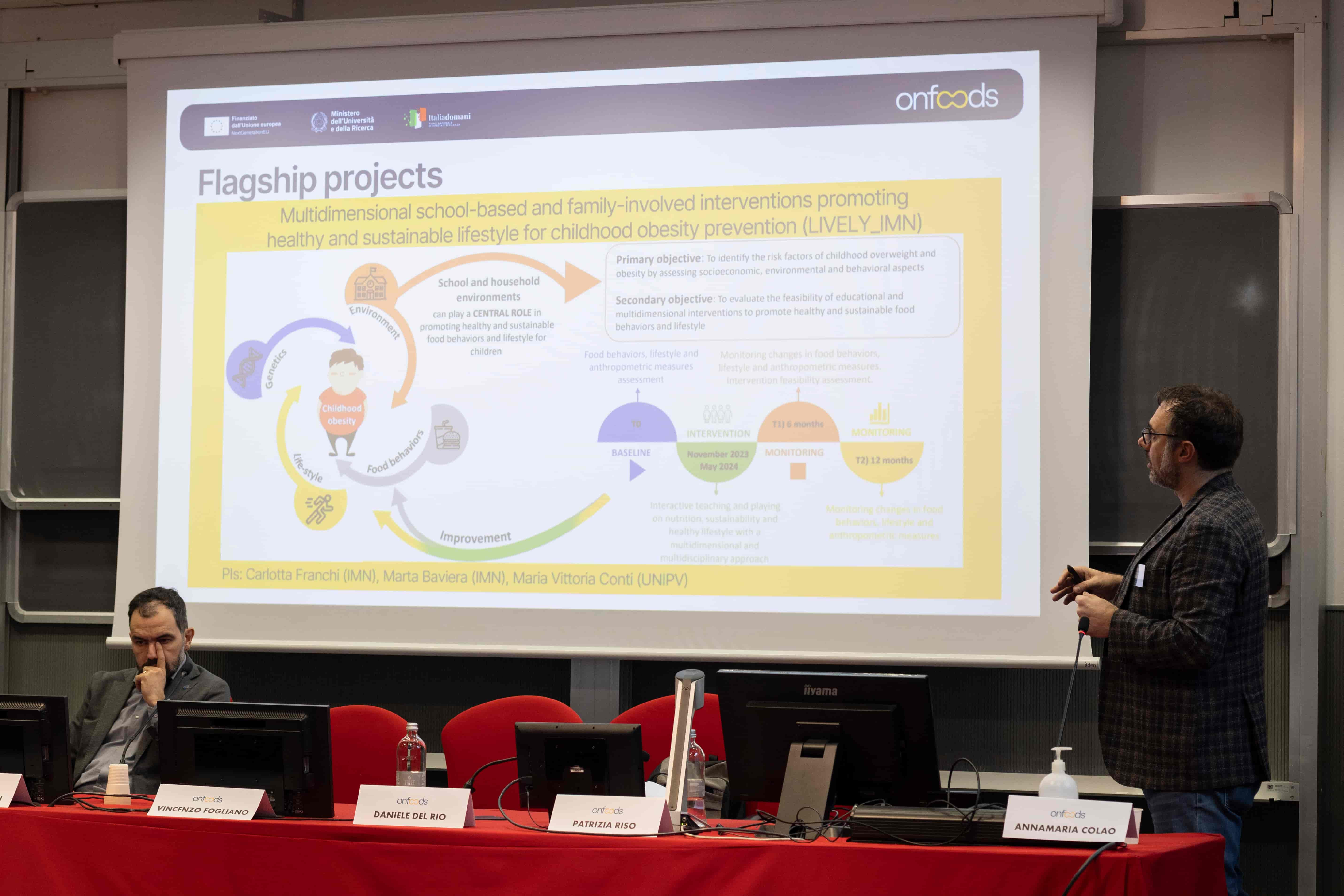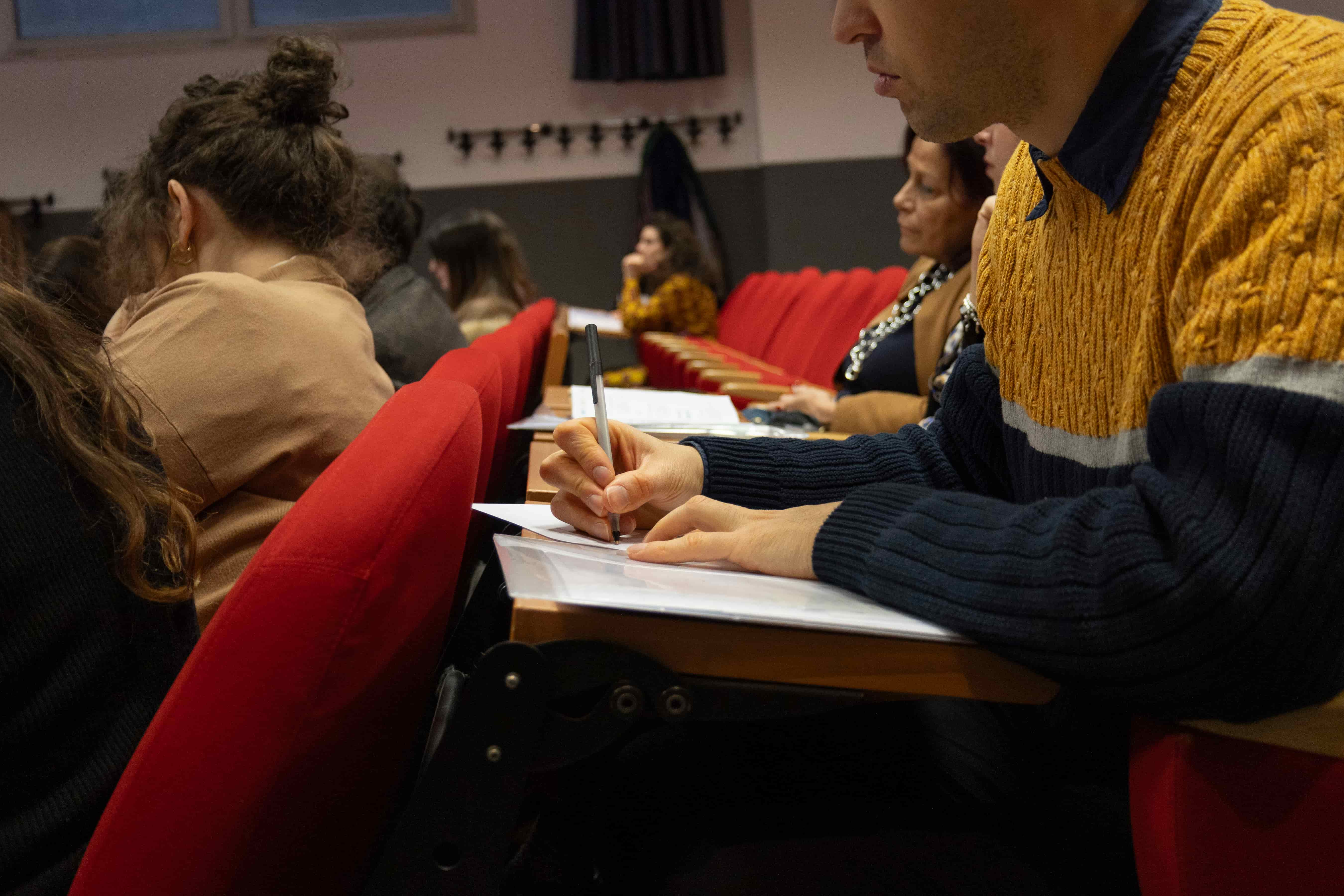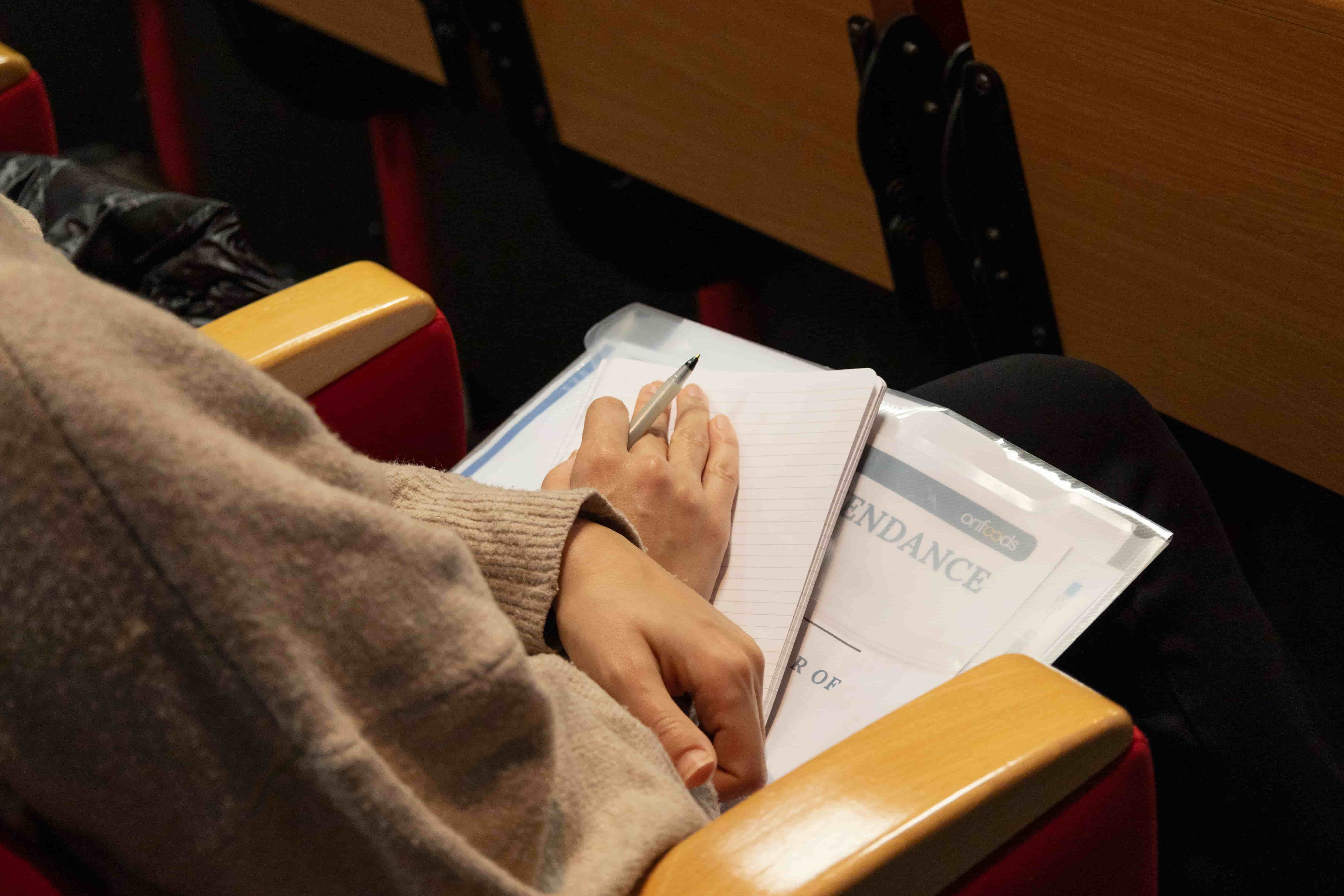Funded under the National Recovery and Resilience Plan (NRRP), Mission 4 Component 2 Investment 1.3, Theme 10.
Two days of multidisciplinary discussion and networking at the University of Milan. OnFoods marks the pace of its first year of activity
The two-day event dedicated to disseminating OnFoods research concluded on Tuesday, January 30th, with over 400 registered participants. This included researchers in attendance and those connected remotely, who listened to more than twenty scientific reports on the advancement of research projects. There was a special focus on the work of young researchers, and the event concluded with the launch of the mentorship program activities.
"It was immensely satisfying" commented Professor Patrizia Riso, coordinator of Spoke 4 at the University of Milan, "to organize the event here in Milan for the dissemination of the results achieved by our working groups to date. The significant participation of partners and industrial entities, along with a clear sense of enthusiasm and alignment with the mission of the OnFoods project, marked a tremendous success. Numerous networking opportunities among colleagues emerged, leading to concrete discussions on potential future joint actions. Above all, this event provided visibility for our young researchers, who played a fundamental role in the research".
Each presentation slot began with an introduction by the Spoke leaders, providing updates on the overarching goals, current progress of the projects, and potential collaborative opportunities with other internal and external research groups within the OnFoods network. Following these updates, two young researchers from each Spoke presented their projects and engaged in a dialogue, answering questions and addressing feedback from the international reviewers in attendance.
The talks covered a broad range of disciplinary perspectives, including socio-political and cognitive sciences, design for social innovation, ICT and AI for the food sector, microbial biotechnology for the circular economy, novel food design, personalized nutrition, clinical approaches to malnutrition, and much more.
The entire thematic range of OnFoods was addressed, encompassing sustainability of production systems, sustainable diets, food safety and food waste, quality diets and food, food production technologies, and food safety and security.
OnFoods was born, not surprisingly, with the idea that the challenges of food and nutrition sustainability can only be addressed through a systemic and interdisciplinary approach, as demonstrated by the recent event in Milan.
The President of the OnFoods Foundation, Daniele Del Rio, commented:
This event was an excellent opportunity to showcase the first and very promising results of the project, both to external stakeholders and within the OnFoods working team. The tangible benefits of the two days are evident: new collaborations have been established, and there has been a significant increase in awareness, especially among the young researchers involved. They now recognize that they are part of an historic initiative with the more than justified ambition of changing the horizon of research in the food sector. This change is made possible by OnFoods’ evident ability to address any issue with an unprecedented multidisciplinary approach.

Inside the research, with the "Early Career Scientists"
OnFoods is emerging and developing as a highly collaborative project involving over 600 participants from 26 organizations, including universities, research centres and companies. All are dedicated to research and the promotion of sustainable development in the food and nutrition sector.
The project has already welcomed more than 100 young scientists, including PhD students, post-doctoral researchers and assistant professors, representing a significant investment in young talent. For this reason, the event on January 29th and 30th was specifically designed to give space to the voices of young researchers.

First day: contributions from Spokes 1, 2, 3 and 4
On Monday, January 29, seven early career scientists from different disciplines debated a wide range of research topics, including the improvement of urban food supply systems, co-design methods for food business models focused on social sustainability, extracting 'value' from food waste products, innovations in sustainable packaging, biotechnological advances in food production, and more.
Let us briefly review the subjects that were discussed on Day 1:
Annalinda De Rosa (Politecnico di Milano, Spoke 1, Project PPT_URB) discussed public and private food procurement as a policy tool to improve the quality, diversity, accessibility and sustainability of local food systems through food production and distribution, consumption and waste management.
Rungsaran Wongprawams from the University of Parma (Spoke 1, GEN_YOU project) discussed Living Labs and participatory methods as useful tools for understanding the needs of local production chains and co-designing solutions to improve consumer rights, gender equality and youth employment in the food sector.
Francesca Annunziata from the University of Milan (Speaker 2) discussed innovative approaches to the exploitation of agri-food waste and highlighted progress made in the EXTRABIO project. EXTRABIO focuses on by-products and biomass waste from various agri-food industries and develops sustainable and innovative extraction protocols to obtain bioactive molecules, both purified and in mixtures. The aim of the project is to optimize at least one sustainable and economically advantageous extraction process for the by-products and wastes of each agri-food and marine chain.
Giulia Leni from the Catholic University of Milan (Spoke 2, BIO-PACK project), also focusing on the production of bioactive extracts from agri-food waste, introduced research on innovative and sustainable packaging systems based on biological compounds rather than conventional plastics. The biomasses used to develop innovative packaging are diverse: coniferous wood waste and by-products, pomegranate, citrus fruits, chestnut sawdust, grape marc and stalks, microalgae and crustaceans.
Tamil Selvi Sundaram (University of Milan, Spoke 3, ECELL_FOOD project) discussed a biotechnological approach to develop sustainable protein sources through cellular agriculture techniques for the production of so-called "cultivated meat ". Cellular agriculture involves the production of food products from individual cells, with the primary objective of creating products comparable to traditional ones. Cultivated meat and fish are already produced by several start-ups, but the technology, methods, procedures and identification of safety risks are not yet widely disseminated in the scientific literature. ECELL_FOOD aims to provide significant results to fill this gap.
Claudia Cortimiglia (Catholic University of Milan, Spoke 3) has presented the advancements of the GMS_TRADITFOOD project in the field of food safety. GMS_TRADITFOOD integrates traditional approaches to microbial risk assessment in food (epidemiological data and physiological characterization of isolated strains) with advanced technologies such as genomics, metagenomics, and other omics techniques. The main objective is to develop a risk assessment based on Whole Genome Sequencing (WGS) of pathogenic bacteria present in italian foods.
Andrea Bresciani from the University of Milan (Spoke 4) first discussed the PRINCE project, which deals with the reformulation of cereal-based products using unconventional raw materials, for the development of new processes or the improvement of existing processes. This project is part of the tasks related to the reformulation or improvement of relevant food products and the innovation of (bio)processes to enhance food quality and sustainability. Furthermore, he presented the COURAGE project, which focuses on the technological and nutritional plant-based reformulation of meat analogue foods.
Leonardo Mancini from the University of Bari Aldo Moro (Spoke 4) discussed the development of alternative flours to wheat for traditional foods high in fibre and protein (LEAFLET), a biotechnological approach to promote environmental sustainability by extending the shelf-life of traditional foods (BARONESS) and a project to promote changes in eating behaviour towards healthier and more sustainable diets (PASSION).
Second Day: Contributions from Spokes 5, 6 and 7
The presentations on the second day of the meeting, Tuesday, January 30, covered the research activities of Spokes 5, 6 and 7.
After the general introductions of the progress made by the Spoke leaders, the presentations of young researchers took place, similar to the previous day. Once again, the range of disciplines and applications was very wide-ranging. Topics discussed included the potential of bioactive compounds in the Mediterranean diet, family dynamics and their impact on childhood obesity, the nutritional status of the elderly population, as well as artificial intelligence and computer vision to improve food service in public canteens.
Here a summary of the presentations of Day 2:
Angela Catapano (University of Naples Federico II, Spoke 5, MED-MITO-FLEX research project) discussed the topic of metabolic flexibility and mitochondrial functions. Her presentation focused on how bioactive compounds present in the Mediterranean diet can be used to develop nutritional approaches that are not only healthier, but also sustainable.
Walter Currenti (University of Catania, Spoke 5) presented the ICARO project, opening with a general overview of obesity and the crucial role of parents in influencing their children's eating habits. ICARO is an observational study, where data are collected and followed up using digital tools, involving children and adolescents (aged 2-18 years) and their parents or caregivers in Southern Italy. ICARO is beginning the recruitment process in Molise and Sicily, with plans to expand to other participating southern regions.
Francesca Coperchini, a researcher from Spoke 6 within the SENIOR project, presented the progress of the group, which is undertaking a systematic assessment of available information on the nutritional status and challenges faced by specific populations at risk of malnutrition. SENIOR is currently building a detailed picture of the nutritional status of older people and is dedicated to identifying new potential risk factors by screening older people at risk or already suffering from malnutrition. The research team is also developing new treatment protocols and personalised interventions to meet the specific needs of older people.
Lucia Tecuta (UniBo, Spoke 7) presented PSYFOOD, a project that examines the psychological factors that affect food choices, investigates the psychological causes behind the adoption of unsustainable diets and eating disorders, and develops evidence-based targeted interventions. The aim is to develop scientifically based psychological intervention protocols to promote healthy and sustainable dietary behaviour change in target populations.
Finally, Marco Buzzelli from the University of Milan Bicocca (Spoke 7) presented the RECCO project, which explores the use of advanced artificial intelligence, sensor technology and computer vision techniques for food recognition. The goal is to develop healthier and more sustainable food models, including food waste reduction, to be implemented in public canteens.
Empowering future researchers: the new mentorship program
The day of January 30th concluded with a series of presentations introducing the Early Career Scientists' Mentorship Program.
To nurture the professional development of the early career scientists, OnFoods has encouraged young researchers at each Spoke to create a Mentorship Program dedicated to offering advanced training opportunities, not only in their specific scientific fields but also in essential cross-disciplinary skills. Each mentorship program, therefore, encompasses both the specific research areas of each Spoke and areas such as project management, scientific communication, and the complexities of grant proposal writing, all of which are essential for a successful research career.
"The Mentorship Program," comments Claudia Favari (University of Parma, Spoke 4), a researcher who serves as the representative of the Early Career Scientists group at OnFoods, "will have a notable impact on ECS careers. Exchanges between ECSs will be crucial in building a multidisciplinary hub to support their professional and personal growth and foster long-term collaborations. Furthermore, we aim to promote networks of collaboration between academic institutions, research centers, and industry, enabling early-career scientists to build professional relationships that can be valuable for their future."
Knowledge exchange and transdisciplinary collaboration
Each Spoke’s Mentorship Program is designed and implemented by young researchers, based on their needs and preferences in terms of activities and topics they wish to explore in depth. This bottom-up approach aims to begin with the needs of researchers in order to reach the definition of shared solutions.
The Mentorship Program is also crucial for promoting more participatory training methods, necessary for co-designing solutions that are transdisciplinary, innovative and sustainable.
As Sonia Massari (University of Pisa, Spoke 1) underscores, "A mentorship program tailored for early career scientists is not just a training ground where one individual imparts knowledge to others. Instead, it serves as an exchange platform where experiences and expertise are integrated in a transdisciplinary manner to contribute to the co-construction of shared knowledge. This process is similar to building a scaffolding framework for both personal and professional growth within the OnFoods project, fostering a collaborative environment where individuals collectively enhance their skills and understanding."
The mentoring program was presented by Claudia Favari, Caterina Rettore, Michele Maccari and Sonia Massari.







